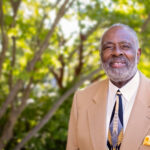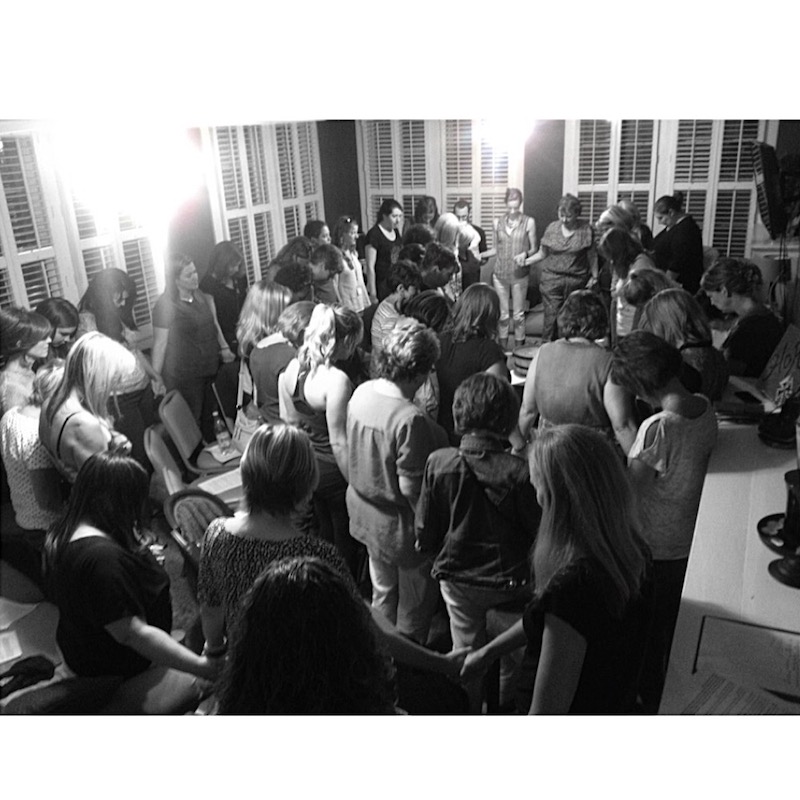The first time Rachelle Starr walked into a strip club, she made sure she wore a turtleneck and no makeup. She also brought three girls from her church.
“I didn’t want to look assuming,” she said.
She didn’t. Less than two minutes in, the bartender asked Starr and her friends, “What on earth are you girls in here for?”
Starr was big-eyed; the daughter of a pastor, she hadn’t been allowed to watch movies with strip clubs in them. The dark room, the neon lights, the loud music, and the dancing girls were all new to her.
But she knew exactly what to say.
“Jesus has sent me here to do something kind and loving for the women in this club,” she told the bartender. Starr can still recite those exact words nine years later; she felt like they were straight from God. “Can I bring a meal in?”
“No,” answered the bartender. (“Her face was priceless,” Starr remembers.) “That’s the craziest thing I’ve ever heard. Absolutely not.”
“Can I talk to the manager or the owner?” Starr persisted.
“No,” the bartender said. “He’s busy.”
So Starr and her friends sat at the bar, drinking Sprite and Coke and chatting with the bartender and her customers.
“About 30 minutes later, I felt the presence of God move me to go over to a man,” Starr said. She introduced herself, shook his hand, and told him, “Jesus sent me here to do something kind and loving for the women in this club.”
The man was the owner of the club. His mouth dropped open. “You’re what?”
She repeated herself. He told her that in his 30 years of management, he’d seen Christians protesting outside, but he had never knowingly had one in the club.
“Well, here I am,” she said.
He let her bring in a meal, then another. Nine years later, Starr’s Scarlet Hope ministry serves 22 of Louisville’s 23 clubs—though this work can be spotty. As management shifts, access can change. “I’ve never kicked out someone who I wanted here more,” one owner told Starr. But her work was taking away his employees, and “I have to put food in my kid’s mouth.”
His concern was real: Scarlet Hope has helped 600 women transition into new careers, and hundreds have accepted Christ. More than 300 volunteers and 21 staff now minister to between 300 and 400 sex workers, and Starr has started a conference to help others do the same in other cities.
“I had to pay $10 to get in the door,” Starr says of that first night. “Some people are like, ‘You paid that club $10?’”
She laughs. “I did. It was the best $10 I ever spent in my life.”
Beginning
Before Starr was the executive director of a ministry to sex workers, she managed sales and marketing for a media company. In early summer 2007, about a year after moving near Louisville with her husband, she was driving past a strip club when God prompted her “to go share my hope and love with the women in that place.”
The message was “very loud”; she couldn’t miss it. So she immediately contacted her husband.
“Hey, God is calling me to work with women in the sex industry,” she told him.
He didn’t miss a beat. “That’s what Jesus would do.”
Starr spent the next year praying and researching.
“I would go every Tuesday and Thursday night with a couple of friends and sit across the street from the strip club and pray for God to open the doors, to make a way for us to reach them,” she said.
After a year, God showed her it was time. So she and a few friends fasted and prayed for 48 hours. Then they walked into the strip club—the friends nervous, Starr “confident that the Lord was going to show up.”
He did.
Growing
The next week, Starr walked back into the club, this time with homemade fried chicken, green beans, and macaroni and cheese.
“Where are you from?” the ladies asked as she handed them plates free of charge.
“I’m not from a restaurant,” Starr said. “I’m here because Jesus loves you.”
That was enough to turn some off altogether; several wouldn’t eat because they thought the food was poisoned.
But Starr kept coming back. “It took us six months to build any sort of trust,” she said. “Now I understand why trust is so hard for them. It’s hard to believe in God when everybody on earth has failed you.”
Buoyed by her success, Starr approached another club, then another. She began sending teams of two or three Christian friends out to each club with a meal every Thursday night. They’d stay for a few hours, serving either in the dressing room (“It’s a good way to build relationships, because they’re doing their hair and makeup and don’t have to pretend to be somebody else”) or on the floor (“It’s a great witness to everyone who walks in the club”).
Within a few weeks, some of the women began asking for help. One was addicted to heroin. Another was homeless and living in her car. Another really wanted to go back to school.
Starr couldn’t refer them to anyone else—“I could count on one hand the number of organizations [across the country] doing similar work.”
So she started investing in one person at a time. The first was an 18-year-old who wanted to go to culinary school. Starr, who at one point made wedding cakes as a side job, was immediately empathetic.
And when Starr helped her carry her bags up to her attic apartment one night, she was heartbroken to discover “the only thing she had in there was a princess sleeping bag. She used her dance duffel bag as her pillow.”
Starr pulled together donations of household items, and was touched by how it changed the young woman’s life. “That was the beginning of finding resources and partnerships and programs so that we could truly meet the needs of some of these people.”
Starr named her work Scarlet Hope, for the color of the robe placed on Jesus (Matt. 27:28). (“If I had a dollar for every time someone thought the ‘scarlet’ was for Rahab’s cord or for The Scarlet Letter, I’d be rich!” she said.)
Over the course of six months, she’d watched women take off their clothes, come to work with black eyes, and be literally spit upon. When she read about the same thing happening to Jesus—albeit in a very different context—she felt God was saying, “I was stripped and mocked and beaten for these ladies. I died for them.”
The name also came from an encounter with a young woman Starr saw only once. It was Scarlet’s first night as a stripper, and the only way she’d found the courage was by getting drunk before she even arrived. Starr shared the gospel with her, and Scarlet asked God to forgive her and save her. In the end, she threw up on Starr, and Starr named the ministry after her.
The next few years were trial and error. Starr tried just offering Bible study classes once or twice a week, but soon recognized that the ladies “needed everyday touches.” She built up a huge mentoring program only to realize that not all mentors are equipped to deal with the sometimes dishonest skills women develop to survive the traumas in their lives.
Starr dipped into social enterprises, having the women make body scrub and lotions to sell online, but they didn’t generate enough income to sustain themselves. For a while she offered housing, but she didn’t have the staff and training to deal with the substance abuse and mental illness problems that cropped up.
Finally, she hit on an idea that worked.
Scarlet’s Bakery
Three years ago, after closing down the housing program, Starr pitched her board chairman an idea. She’d open a bakery, since that was something she knew how to do. She’d use it to teach job skills. And she’d run it like a full-time internship, paying the women so they could transition out of the industry.
“If you want someone to stop doing something, and they don’t have any idea how to get out of where they’re at, you have to provide an alternative,” Starr said.
By December 2015, Starr had a business plan, a business director, a building, and a renovation. A little more than a year later, Scarlet’s Bakery has catered 2,500 cookies to The Southern Baptist Theological Seminary, hundreds of cupcakes to a local school, and desserts for corporate events. It’s garnered five stars on Yelp and a shout-out from actor Alan Cumming.
“We’re still working toward being a successful business, but the program related to the business is going amazing,” Starrsaid.
Transitioning a woman from dancing in a strip club to making cupcakes in a bakery isn’t done quickly.
After meeting the women through the Thursday meals, volunteers invite them to Club Zero.
“We don’t share the names of the clubs, but call them one, two, three, and so on,” Starr said.
Club Zero, then, is Starr’s club. Once a week, for three hours in the evening, women come to Sojourn Community Church—where Starr attends—for Bible study and support groups for addiction recovery. Their children come, too, for programming that aims to break the cycles of abuse. About 20 women currently attend; they bring about 50 children with them.
“The kids are getting an opportunity their moms didn’t, to hear the gospel at a young age,” said Williams, who modeled the program after Sunday school. The work is both beautiful and heartbreaking—the kids have already seen trauma, and are sometimes lost in custody battles. Their aspirations are sometimes desperate. One mom, who turned to prostitution at 13 to provide for her sick mother, just wanted her daughter to get through high school without having to sell herself.
Of the women in the class, about 10 can move into the career development program. For 18 months, they clock in Monday through Friday, working 30 hours a week. It’s not all at the bakery—Scarlet Hope recently began requiring classes on life skills like parenting, checkbook balancing, and exercise, which gives them “new coping skills and habits.”
Scarlet Hope pays $10 an hour, which is higher than the Kentucky minimum wage of $7.25 an hour but still not a lot. So Scarlet Hope helps to line up childcare or provide food—anything they can to keep the women falling back into old ways of survival.
The program will graduate its first participant in May. She’s also been going to school for radiology, and already has a job lined up for after graduation. That’s crucial for Starr, who wants to see every graduate safely into another paying job before letting go.
The New Africa
“Almost weekly we get inquiries about how to do this type of ministry,” Starr’s assistant Emily Williams said. “I joke that the sex industry is the new Africa for Christians.”
Interest soared after the 2012 Passion Conference, which highlighted human trafficking. “We got tons of zealous college students interested in serving,” Williams said.
While college students can be non-committal and easily distracted, they’re also generally passionate and fearless, she said. The Passion students were “overall . . . a great blessing”; one now serves on staff.
Women who left the industry are also drawing attention to it. Ex-escort Annie Lobert started the nonprofit Hookers for Jesus in 2007 after God saved her from prostitution. Her story, told in the 2015 autobiography Fallen, was also featured in a three-part television documentary and multiple news articles. In 2011, former stripper Harmony Dust released her autobiography, Scars and Stilettos, detailing how she came to Christ and founded Treasures, an outreach and support group for women in the sex industry.
Several recent movie and television documentaries are also showing the dark underbelly of the world that can sometimes—think Pretty Woman or Magic Mike—be portrayed as glamorous.
To accommodate the interest, as soon as Starr moved Scarlet Hope into a 501(c)(3) in 2009, she started planning ways to share what she’d learned. In 2010, Scarlet Hope hosted its first conference for those working with the sex industry in other cities. In 2016, attendance topped 300.
“We have trained people in over 100 different cities to do this work,” Starr said. She offers workshops in getting started, in fundraising, in caring for women who have had an abortion, and setting healthy boundaries.
What’s missing: sessions on picketing in opposition or on advocating for legislation.
That’s because those who work in the sex industry have a complicated relationship with laws. On the one hand, legislation has helped to close four strip clubs in Louisville in the past 10 years. In January, Scarlet Hope cheered when a federal investigation caused Backpage.com to close the adult advertising section of its site.
On the other hand, closing strip clubs or websites doesn’t change hearts. Instead, it drives the sex business underground, to massage parlors or the dark net. “That makes finding them a little harder,” Starr said.
Starr also doesn’t spend a lot of time on sex trafficking.
The bulk of the sex industry consists of strippers and erotic massagers, prostitutes and escorts, she said. Sometimes Christians ask Starr why she works with them instead of trafficking victims, since they apparently chose that lifestyle.
“You have no idea what a lady had to go through to lead to these decisions,” said Starr, who has never met a woman from the industry who wasn’t abused as a child.
The Scarlet Hope conference, like the ministry, isn’t focused on legislating the sex industry to death. Instead, Starr would rather kill it with kindness, reaching in to rescue the women one heart at a time.
Darkness and Light
Pulling women out of the industry is a slow, one-step-forward-and-two-steps-back process, Starr said. She and her team often feel like the person standing on the beach in the starfish parable, tossing back one stranded echinoderm at a time, undeterred despite the enormity of the task.
Because even though Scarlet Hope has helped 600 women leave the industry, they don’t always stay gone. And for every woman that does, “five more walk in the door,” Starr said.
She’s even seen it on a larger scale. When one of the club owners came to Jesus through the influence of Scarlet Hope, she shut down her club. But she sold it to another club owner, and it opened again nine months later.
Also discouraging is the darkness. The women suffer from the emotional and mental scars of childhood abuse, from mental disorders, from the aftermath of abortion decisions. When Starr took a three-month sabbatical, five of the ladies she had been working with died of drug overdoses.
“That’s why we hold these programs so loosely,” she said. “It’s the gospel that’s going to save them, not a program. We never know if we’re going to see them again, so we’re all about Jesus Christ.”
It’s hard to keep steady volunteers in the dark places. “You can be working so hard with a woman, and then it’s disheartening if she drops off the face of the earth or is put in prison,” Williams said.
The average time a volunteer stays with Scarlet Hope is two years, though some have been with Starr since the beginning. She holds quarterly retreats and trainings to keep them refreshed and connected. “Unity is incredibly important for this type of thing, because you don’t want to be disunified in the darkness,” she said.
From those who stick with it, Starr and Williams have seen beautiful fruit.
“Life is a vapor and then it’s gone,” Williams said. “[Starr] is choosing to use what little time she has to show Christ to these women. And she’s giving other women the opportunity to do the same thing. . . . She is not only touching dancers’ lives but has transformed hundreds of Christians’ lives.”
One of those lives is Starr’s.
“I myself have changed more by meeting broken people and knowing their desperate need than in 20-plus years in a church,” she said. “For me, this was so uncomfortable and so awkward, and I had no idea what I was doing. I had to 100 percent rely on the Spirit. . . . There hasn’t been anything else in my life that has pushed me to know Jesus at an intimate level like this.”
Is there enough evidence for us to believe the Gospels?
 In an age of faith deconstruction and skepticism about the Bible’s authority, it’s common to hear claims that the Gospels are unreliable propaganda. And if the Gospels are shown to be historically unreliable, the whole foundation of Christianity begins to crumble.
In an age of faith deconstruction and skepticism about the Bible’s authority, it’s common to hear claims that the Gospels are unreliable propaganda. And if the Gospels are shown to be historically unreliable, the whole foundation of Christianity begins to crumble.




































